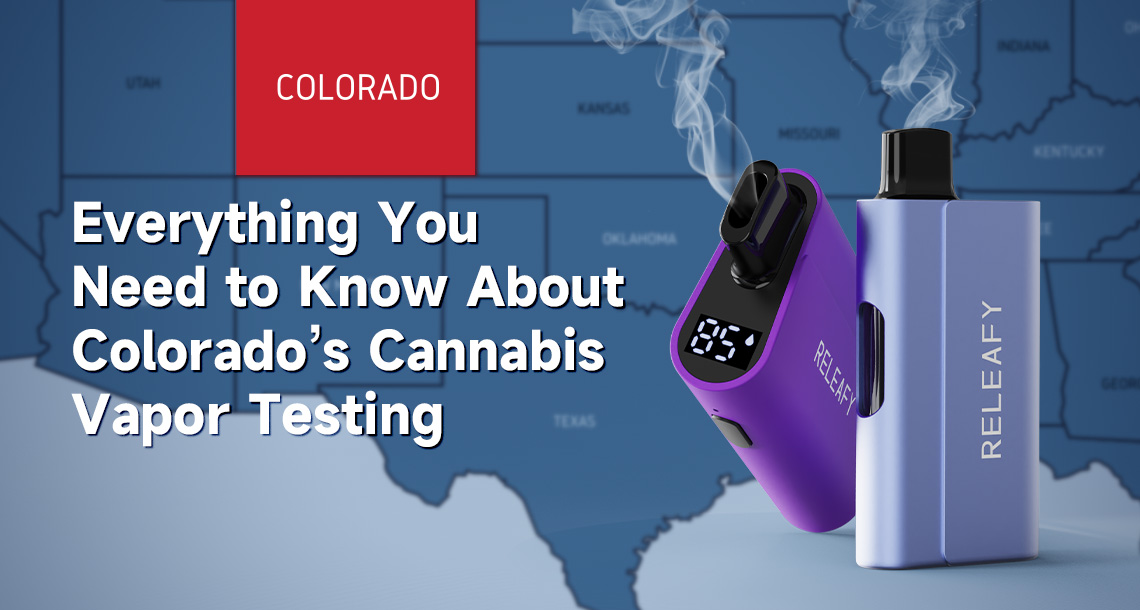
Which Factors Cause Cannabis Vape Extracts To Lose Their Potencies and Tastes Quicker?
August 31, 2023
The Ultimate Guide to Choosing The Best THC Vape Hardware For My Cannabis Vape Brand
September 8, 2023
Which Factors Cause Cannabis Vape Extracts To Lose Their Potencies and Tastes Quicker?
August 31, 2023
The Ultimate Guide to Choosing The Best THC Vape Hardware For My Cannabis Vape Brand
September 8, 2023
Everything You Need to Know About Colorado’s Cannabis Vapor Testing
In a significant move aimed at ensuring consumer safety and maintaining product quality, Colorado’s Marijuana Enforcement Division (CMED) introduced a new regulatory requirement for the cannabis industry. On Wednesday, October 7, this proposal by the testing subcommittee of CMED was formally added to the state’s list of cannabis regulations, with the rule taking effect on January 1, 2022. The new regulation specifically pertains to the testing of metal contamination in cannabis concentrates used in vaporized delivery devices. Let’s dive into the details of this important development and understand its implications for the industry and consumers alike.
The Regulation at a Glance
The crux of the newly introduced regulation can be summed up in a single statement: “Each Harvest Batch and Production Batch of Regulated Marijuana Concentrate in a Vaporized Delivery Device must be tested for metals contamination via emissions testing by a Regulated Marijuana Testing Facility.”
This regulation aims to ensure that the cannabis concentrates used in vaporized delivery devices are free from harmful levels of metal contamination. The primary metals of concern are arsenic, cadmium, lead, and mercury, all of which can have serious health implications when inhaled, ingested, or absorbed into the body. The regulation is designed to safeguard the health and well-being of consumers by setting stringent testing standards for these harmful contaminants.

Why Metals Contamination Testing Matters?
Metals contamination in cannabis products can occur as a result of various factors, including the cultivation process, extraction methods, and packaging materials. These contaminants might find their way into the final product, posing potential risks to consumers who rely on vaporized delivery devices to consume cannabis concentrates. When these concentrates are heated and vaporized, any traces of metals can be released and subsequently inhaled, which can have adverse health effects over time.
Testing Protocol and Parameters
The metals contamination test required by this regulation is comprehensive and meticulous. The testing must not be limited to the presence and amounts of arsenic, cadmium, lead, and mercury, though these elements are the main focus. Regulated Marijuana Testing Facilities are responsible for conducting emissions testing to accurately determine the levels of these metals in each Harvest Batch and Production Batch of Regulated Marijuana Concentrate.
This rigorous testing protocol ensures that consumers are protected from potential health hazards associated with these metals. Furthermore, it incentivizes cannabis producers to maintain high-quality production practices, as any failure to comply with the testing standards can lead to significant consequences for their business.
Industry Impact and Compliance
The implementation of this new regulation represents a significant step forward for Colorado’s cannabis industry. By prioritizing consumer safety and setting clear testing standards, the state is setting a precedent for responsible cannabis regulation. As the cannabis market continues to expand, such measures are crucial to maintaining consumer trust and confidence in the products they purchase.
For cannabis producers and manufacturers, compliance with this regulation is not only a legal obligation but also an ethical responsibility. Adhering to strict testing standards ensures that the products they bring to the market are safe, reliable, and of high quality. It also demonstrates their commitment to the well-being of their customers and the long-term sustainability of the industry.

The Implementation Process and Collaborative Efforts
Implementing a regulation of this magnitude requires careful planning and coordination among various stakeholders. The process of enforcing the metals contamination testing rule involves multiple steps, including educating cannabis producers, testing facilities, and consumers about the new requirements.
Regulated Marijuana Testing Facilities play a crucial role in this process. These facilities must be equipped with the necessary technology and expertise to accurately conduct emissions testing for metal contamination. They must adhere to strict protocols to ensure consistent and reliable results. The state authorities, along with industry experts, are likely to provide guidance and support to testing facilities to help them meet these standards effectively.
For cannabis producers, the regulation necessitates a heightened focus on quality control and compliance. They must ensure that each batch of regulated marijuana concentrate intended for vaporized delivery devices undergoes the required testing for metal contamination. This involves maintaining meticulous records, collaborating with accredited testing facilities, and promptly addressing any issues that arise during testing.
Consumer Awareness and Education
As a consumer, staying informed about the products you consume is paramount. With the implementation of the metals contamination testing regulation, you can be assured that Colorado is taking steps to protect your health and well-being. However, it’s also important to be proactive in understanding the regulation and its implications.
When purchasing cannabis concentrates for vaporized delivery devices, look for products that display compliance with the testing requirements. Reputable producers will likely provide information about the testing process, results, and the steps they take to ensure the safety of their products. By choosing products from responsible and compliant producers, you contribute to the success of the regulation and send a message that consumer safety is a priority.
Continuous Improvement and Future Developments
Colorado’s Cannabis Vapor Testing regulation is a significant stride in the right direction, but it’s important to acknowledge that regulations and testing standards may evolve over time. State authorities, along with industry professionals and consumer feedback, will likely evaluate the effectiveness of the regulation and make necessary adjustments as needed. This iterative process ensures that the cannabis industry remains aligned with the latest scientific knowledge and best practices.
The regulation’s success also opens the door for potential collaborations and research initiatives aimed at improving testing methodologies, refining standards, and exploring innovative ways to enhance consumer safety. As technology advances and our understanding of contaminants deepens, the cannabis industry can continue to raise the bar when it comes to product quality and safety.
How should vape brand wholesalers respond to these regulations?
For vape brand wholesalers, complying with Colorado’s Cannabis Vapor Testing rule is essential to ensure the legality of their products within the state and to maintain the trust of consumers. Here are the key steps that vape brand wholesalers should take to adhere to the regulation:
1. Educate Themselves: Vape brand wholesalers need to thoroughly understand the regulation and its requirements. This includes comprehending the specifics of emissions testing, the heavy metals of concern, and the testing frequency for different batches.
2. Communication with Suppliers: Wholesalers should communicate with their suppliers, including cultivators, cannabis oil manufacturers, and vape pen manufacturers, to ensure that the cannabis concentrates they receive have undergone the necessary emissions testing and that the vapes are also tested for heavy metals. It’s essential to collaborate with reputable suppliers who prioritize compliance with the regulation.
3. Verification of Testing: Wholesalers should verify that the batches of regulated marijuana concentrates have indeed undergone emissions testing for heavy metal contamination. This verification can involve requesting testing certificates and documentation from the suppliers.
4. Labeling and Packaging: Vape brand wholesalers should ensure that the products they distribute are appropriately labeled and packaged. This includes providing clear information to consumers about the emissions testing conducted on the product batch. Transparent labeling builds consumer trust and demonstrates a commitment to safety. Customization options are available for the package and label through your chosen vape pen manufacturer.
5. Documentation: Keep thorough records of the testing and verification processes. Documentation can serve as evidence of compliance and can be useful in case of audits or inquiries from regulatory authorities.
6. Quality Assurance: Wholesalers should implement quality assurance processes to consistently monitor the compliance of the products they distribute. Regularly reviewing testing documentation and conducting internal audits can help identify any potential issues early on.
7. Stay Updated: Regulations can evolve over time. Vape brand wholesalers should stay informed about any updates or changes to the Cannabis Vape Emissions Testing rule. This might involve subscribing to industry newsletters, attending regulatory workshops, and actively participating in relevant industry associations.
8. Customer Education: Educate your customers, such as retailers and dispensaries, about the importance of emissions testing and the steps you’ve taken to ensure compliance. Sharing this information can reinforce your commitment to providing safe and reliable products.
9. Adaptability: As the regulatory landscape changes, vape brand wholesalers should be prepared to adapt their processes and practices. This might involve adjusting sourcing strategies, updating documentation procedures, or refining quality assurance protocols.
10. Collaboration with Testing Facilities: Establish relationships with regulated marijuana testing facilities. They can provide guidance on the testing process, share insights on best practices, and ensure that your products meet the required safety standards.
11. Feedback Loop: Maintain an open feedback loop with regulatory authorities. If you encounter challenges or have suggestions for improving the regulation’s implementation, communicating with relevant agencies can contribute to its refinement.
In essence, vape brand wholesalers should approach this regulation as an opportunity to prioritize consumer safety, build credibility, and contribute to a responsible and accountable cannabis industry in Colorado. Adhering to the Cannabis Vape Emissions Testing rule not only ensures compliance but also showcases a commitment to consumer well-being.
Conclusion
Colorado’s Cannabis Vapor Testing regulation, implemented on January 1, 2022, underscores the state’s dedication to consumer safety and product quality within the cannabis industry. By requiring rigorous testing for metal contamination in cannabis concentrates used in vaporized delivery devices, the state is taking proactive steps to mitigate potential health risks and maintain the industry’s integrity.
As consumers, it’s essential to be aware of these regulations and to support companies that prioritize safety and compliance. By doing so, we contribute to the growth of a responsible and trustworthy cannabis market that places our well-being at the forefront.
In summary, Colorado’s Cannabis Vapor Testing regulation is a significant milestone in the journey toward a safer and more accountable cannabis industry. It not only protects consumers but also highlights the importance of setting high standards for product quality and safety in a rapidly evolving market.